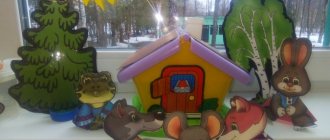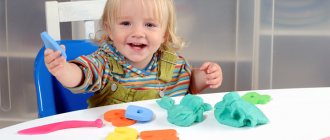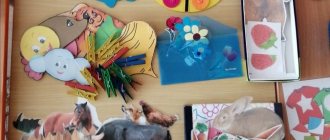Project "Hello, summer!" in the second junior group
Project “Hello, Summer!” Type of project: Creative Duration of the project: 2.06-14.06 2016 Project participants: Teacher, children, parents, specialists Number of participants: Collective Relevance of the project: Summer is an amazing time! In summer, the daily routine of the kindergarten provides for maximum exposure of children to the outdoors. It is very important that children’s lives during this period are meaningful and interesting. Children of the second youngest age group are just beginning to explore the world around us. It is important for three-year-old children to develop elementary sensory concepts and visual and effective thinking. Experimental research activities and didactic games contribute to the development of cognitive activity in children. Outdoor games, entertainment, morning exercises, outdoor physical education, and sand play provide the necessary level of physical and mental health for children. Involving parents in this project makes them more educated in matters of raising an inquisitive, healthy child and spending interesting leisure time in the family. Project problem: Children who are just beginning to learn about the world around them have little understanding of the natural phenomena of animate and inanimate nature, including summer. Younger age is the age of “why”. It is at this age that children most often have questions - why and why? In conversations, children cannot answer many questions themselves, for example: What happens in nature in the summer? Why do you need the sun? Where do puddles come from? Why do you need rain? In order to develop children's knowledge about seasonal natural phenomena, this project was developed. Project goal: To develop children's knowledge about seasonal phenomena of living and inanimate nature. Creating comfortable conditions for children’s health, strengthening the physical and mental health of preschoolers. Project objectives: 1. Teach children to note summer changes in nature; 2. Teach children to convey images in productive activities; 3. To develop in children the ability to listen and understand literary words; 4. Teach children to experiment; 5. To form in children ideas about the relationship between nature and man; 6. Teach children to see the extraordinary beauty of nature and enjoy the world around them; 7. Develop observation, creative imagination, ideas about the world around us, voluntary memory and attention; 8. To instill in children an interest and respect for nature; 9. Enrich children's vocabulary with new words. Expected results for children: 1. Enrichment of knowledge about seasonal natural phenomena; 2. Formation of children’s ability to experiment; 3. Formation of children's knowledge about health; 4. Formation of children’s skills to interact with each other and with their parents. Expected result for parents: 1. Activation of work on project implementation; 2. Formation of interest in spending interesting leisure time in the family. 1. Preparatory stage: Forms of work with children: 1. Conversations with children in order to identify children’s knowledge about summer. 2. Reading and memorizing poems, nursery rhymes, riddles about summer, looking at illustrations, paintings about summer; Forms of work with parents: - consultation; - folders - moving; - creative homework assignment. 2. Main stage: Contents of the project - “Sunshine, sunshine, look out the window...”. - visual activity (drawing) “Here and there, here and there dandelions are blooming...”, “The radiant sun smiled cheerfully.” - modeling “Sun”. - reading fiction “Rain”, “Daisies” (memorizing a poem by Z. Alexandrov). A. Tolstoy “My Bells...”, F. Grubin “White Daisy Sisters”, N. Kurochkina “Elegant Dresses, Yellow Brooches”, L. Voronkova “Chicken in Trouble”, V. Suteev “Chicken and Duckling”, L. Tolstoy “Rozka had puppies”, D. Novikov “Dog Barbos”, V. Zhukovsky “Riddle”, Y. Tuvim “Vegetables”, E. Charushin “Goat”, “Cow”, F. Sammber “In the Circle of Friends”, I Thai “Pick mushrooms”, G. Bill “Newbie on a walk”, Reading nursery rhymes: “Rainbow-arc, don’t let it rain...”, “I’ll tie the goat”, “I’m a goat Me-ke-ke”, “Oh, doo” -du...” - “Trees of our site” (examining the painting). — physical education “Sand circles and squares”, “Flower bed” — Entertainment “Hello, summer! " Experiments: “The influence of sunlight on life on Earth”, “Balls-droplets”, “Pultants or flags”, “Blowing, blowing the breeze”, “Shifting sand”, “Wet sand”, “Drawing on the sand”. Outdoor games: - “Sun and Rain”; - “At the bear in the forest”; - “Round dance”; — “Carousel”; — “The Bear and the Bees”; - “In the clearing”; — “Butterflies and Swifts”; - “The birds have flown.” — Game-situation “Sunny bunnies”; — Game-situation “Flower Meadow”;
-Games with sand: “Builders”, “Road”, “Tower”. — Games with water: “The boat floats, floats”, “Breeze (blow off the boat).” Safety: Conversations with children looking at photographs about health on the topic: “We have grown and become strong.” Examination of illustrations on the topic: “Child on a city street.” Conversations about the rules of conduct on the street and in transport. D/games: “What do people drive”, “Find and name”. S/r. games: “Trip to the dacha”, “Riding on the bus”. A teacher’s story with an examination of illustrations about edible and inedible mushrooms: “Beautiful, but dangerous fly agaric,” “Edible mushrooms.” Consolidating the acquired knowledge on the topic: “Child and other people”, “Strangers or street animals”.
Didactic games: - “Match the middle of a flower and a butterfly”; - “Lay out the pattern according to the diagram”; - “Which tree is the leaf from?” - “Name the tree”; - “Which flower is gone.” Finger games: - “Insects”; - "Butterfly"; — “Bells”; - “Rain”; - "Bug"; - “Bucket sun.” Complexes of morning exercises: - “Radiant sun”; - "Camping in the woods"; - “Butterflies”; — “Spider Bugs”; — “Visiting the sun.” Labor We continue to carry out errands on the street: collect toys before leaving for a walk, water sand from watering cans, sweep the veranda, the area, wipe benches, water flower beds, beds, loosen the soil, care for plants, collect cut grass, collect natural material. We strengthen our dining room duty skills. Work on the project implementation Work on the project implementation took place in an organized manner. Parents actively completed creative homework assignments. Children participated with interest in all activities of the project. Children have formed the idea that life on Earth requires the sun. Thanks to the sun, people, plants, and animals live. Conversations and observations took place on the street, where children learned to identify the characteristic features of flowers, trees, and insects. On walks, children observed rain, wind, clouds, thunderstorms. Reading and learning poems, nursery rhymes, and chants during observations instilled in children a desire to respond emotionally to the beauty of the surrounding nature. The children took part in experimental activities with great enthusiasm. From experiments, children learned about the influence of the sun on life, about the properties of water and sand. When familiarizing themselves with fiction, children learned to answer questions about the content of poems. Reading works took place in the fresh air, where they learned to observe and examine objects of living and inanimate nature. Children were taught aesthetic feelings through poetry and an interest in natural phenomena. Ideas about living and inanimate nature were formed. During the formation of physical education, children learned to independently perform general developmental exercises. Creative abilities developed when performing motor actions. The children enjoyed doing physical exercises in the fresh air and drawing in the sand. The use of flowers, flags, balls, and surprises in the classroom was unexpected and pleasant for the children. Drawing - children were strengthened in their ability to draw in collaboration with the teacher and other children when creating a collective composition. During the modeling class, children learned to smear plasticine on cardboard using pressing movements of the index finger and depict the sun. Specially selected summer themed finger games kept the children entertained. Such games develop children's fine motor skills, coordination of movements, activate speech skills, memory, thinking and awaken creative imagination and attention. Complexes of morning exercises contributed to the activation of children’s motor activity and raised the children’s mood. “Turning” into butterflies, beetles, spiders, imitating “hiking” into the forest, towards the sun, children received new information and performed all this in movements. By moving, the child learns about the world around him, learns to love it and act in it. Breathing exercises are a means of preventing diseases of the respiratory system, and exercises to relieve psycho-emotional nature develop the ability to feel the mood and empathize with others. For younger preschoolers, outdoor games are a vital necessity. With their help, a wide variety of tasks are solved: educational, educational and health-improving. Game situations and rules of the game forced children to move with greater speed in order to catch up with someone, or to quickly hide in a predetermined place (house, nest, in order not to be caught, to deftly overcome elementary obstacles. Outdoor games, due to the variety of their content, helped children to consolidate their knowledge and ideas about the objects and phenomena of the world around them. Didactic games and exercises developed children's mental processes, curiosity, perseverance, their vocabulary was enriched and activated. Interest in verbal and board-printed didactic games was fostered.
At the entertainment “Hello Summer”, which took place in the kindergarten area, the children received an emotional and positive charge. At the festival, children recited poems, danced in a circle, answered questions about the signs of summer, and launched balloons into the sky. Games with flags, balls and soap bubbles developed children's dexterity, speed, ingenuity, coordination of movements and the ability to operate with objects. 3. Final stage: Exhibition of drawings by parents and children “Summer Fantasies” (project product)



